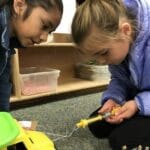Google is out, grandparents are in: Where millennial parents go for child-rearing advice
Millennial parents are avid, but discriminating, readers of parenting information. When deciding what information to use, they consider the source and are less likely to trust celebrities and social media, according to a new survey by the nonprofit group Zero to Three. When it comes to parenting advice, immediate family members — including grandparents and siblings — are the most trusted sources, valued even more than friends and teachers, the survey found.
The “Millennial Connections” survey sampled 1,002 parents and other caregivers of children ages 5 and under nationwide. To ensure a range of parent views were represented, 44 percent of those surveyed were low-income, earning less than $40,000 per year. Millennial parents are defined as those born between the early 1980s and mid-1990s. Parents participating in the survey reported seeking information on a variety of topics; the top three on parents’ minds were developmental milestones, nutrition and language or communicating.
Technology is heavily used: Nearly half of all respondents rely on mobile parenting apps for information relating to parenting and children and 60 percent use science-based websites like WebMD and the Centers for Disease Control. Despite the popularity of social media among millennials, however, only a little more than half of survey respondents said they trust the parenting information they find there, compared to more than 80 percent of parents who trust authoritative websites. Although celebrity endorsements are often successful at selling products, celebrity input on parenting issues holds less sway. Only 13 percent of parents reported placing more trust in parenting information endorsed by celebrities.
The survey found that parent demographics play a role in who parents turn to for advice as well as who they trust. Parents with college degrees were more likely to trust science-based information, for example, compared to parents with less than a high school degree and to lower-income parents. Science-based websites were never used by 22 percent of the lower-income parents surveyed; 27 percent of the less-educated parents reported they did not use such websites.
Latino and African-American parents were more likely to use mobile apps for parenting information than other parents and were also more likely to seek information from their church communities. Latino parents were significantly more active in using online resources to connect with other parents and also tended to seek out information on more topics than other parents, especially those relating to parent-child bonding, physical development and obtaining health care.
The authors of the report suggest that because of the popularity of advice from family members, organizations should send parenting information to the extended family, and make sure grandparents are included. The authors also suggested that organizations partner with medical officials to provide information to parents.
The post Google is out, grandparents are in: Where millennial parents go for child-rearing advice appeared first on The Hechinger Report.
Last Updated on 8 September 2024
We cover inequality and innovation in education with in-depth journalism that uses research, data and stories from classrooms and campuses to show the public how education can be improved and why it matters.




